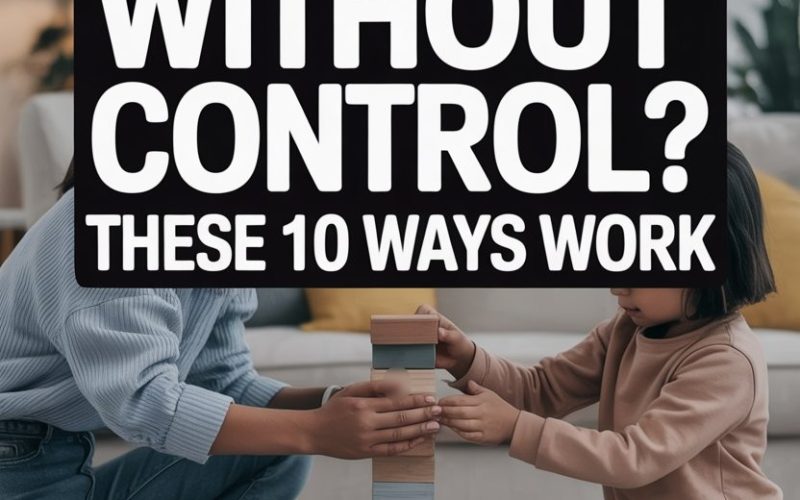Parenting sometimes feels like one long episode of “Whose Boundaries Are They Anyway?”
You’re keen for your home to be filled with respect, laughter, and only the occasional spilled juice box, but you also want your kids to grow up thoughtful and self-regulating—without turning you into a drill sergeant.
Can discipline really work without the iron grip of control? Absolutely.
Here’s how busy parents can raise responsible, compassionate humans—no barked orders or power trips required.
1. Relationship Comes Before Rules
Before a single rule can stick, your connection with your child has to be the main event. Think of it like WiFi—if the signal’s weak, communication falters and nothing loads (least of all your requests to tidy LEGO).
Children who feel understood and liked by their parents are far more likely to cooperate. Laura Markham, Ph.D., author of Peaceful Parent, Happy Kids, points out that connection is the foundation for all effective discipline.
How to do it when you’ve got 400 emails and a mountain of laundry? Small moments matter.
Five minutes snuggled up, a quick chat while you peel carrots, or a genuine “I hear you’re upset” can transform your child’s willingness to listen.
2. Clear Boundaries—And Notice When They Work
Children thrive when they know where the edges are. But boundaries aren’t the same as control.
Rather than long lectures or shifting goalposts, keep it simple: “We use gentle hands,” or “Screens go off at 6:00.”
When things go right, say so: “I noticed you turned off your tablet when I asked. That helps the evening go smoothly for everyone.” (Yes, even if it only happened once this week.)
Consistency is less about never budging, and more about making the rules predictable. A boundary that changes every other day? Well, that’s just an invitation for a pint-sized lawyer to argue their case.
3. Choices Make Cooperation Less Painful
The old “my way or the highway” approach rarely ends with smiles. Letting kids have some choice within your limits gives them a sense of agency.
Try, “Would you like to brush your teeth before or after pyjamas?” or, “You can hop or tiptoe to the car—your pick.” Dr. William Stixrud, clinical neuropsychologist, explains that children with some autonomy are more resilient and motivated.
Don’t confuse choices with chaos—you’re still the grownup who sets the menu. But letting kids pick the plate or the order makes dinnertime less of a battlefield.
4. Natural Consequences Pack More Punch Than Punishments
Nothing takes the wind out of a parent’s sails like a child who shrugs off your “if you do that again…” warnings. Turns out, nature does the heavy lifting if we let it.
When a child leaves her raincoat at school and gets wet the next morning, she learns faster than if you’d scolded her for hours.
Natural consequences aren’t about engineered “gotchas”; they’re simply the logical results of actions. Stepping back (and maybe packing a spare jumper) teaches more than any time-out ever could.
5. Empathy Defuses Power Struggles
When your child’s behaviour makes you want to scream into a pillow, try empathy instead. “You’re so mad your block tower fell down. That IS frustrating!”
Kids don’t want to be difficult—they’re having a hard time, not giving you one. Research on emotional coaching by John Gottman, Ph.D., shows that children whose feelings are acknowledged are better at managing their emotions over time.
Does empathy mean you never say no? Not at all. “You really want to keep playing, and it’s bedtime. That’s tough.” You can be firm and kind at the same time.
6. Routines Are Your Secret Weapon
Busy families run on habits—why not use that to your advantage? When kids know what comes next, they argue less. A visual schedule or simple checklist (“Lunch, teeth, shoes, out the door!”) takes the pressure off both parent and child.
Routines aren’t just for toddlers. Teens benefit too—just swap “nap” for “WiFi break.” Over time, routines become the boss, not you. Imagine that: less nagging, more coffee.
7. Problem-Solving Together Grows Brains (And Kindness)
When rules get broken (as they will), treat it as a shared mystery to solve, not a crime to punish. “You and your brother are fighting over the remote. What can we do so both of you feel heard?”
Collaborative problem-solving, championed by psychologist Ross Greene, helps kids develop empathy and creative thinking.
Don’t worry if your negotiations look a bit like Brexit. The point isn’t a perfect peace treaty, but helping kids practise working things out with your support.
8. Model What You Want to See
Fancy a child who doesn’t yell, hit, or whine? Time to check your own habits in the hall mirror. Little eyeballs are always watching.
If you speak respectfully, apologise when you stuff up, and handle stress without hurling slippers, your children are more likely to follow suit.
This isn’t about being superhuman—“Sorry, I lost my temper. Let’s try again,” is more powerful than pretending you never get cross.
9. Praise Effort, Not Just Outcomes
“Good job!” is lovely, but “I saw you worked hard at that puzzle, even when it was tough,” goes further.
Carol Dweck’s research on growth mindset shows that children praised for effort rather than innate talent are more persistent and resilient.
Save your high-fives for process, kindness, and progress. A child who’s noticed for sharing, thinking, or trying again is more likely to repeat it—even if the tower still falls over.
10. Self-Regulation Beats Parental Policing
At the end of a long day, the dream isn’t just kids who listen to you—it’s kids who listen to themselves. Self-regulation is the ultimate goal.
Short-term obedience looks great on Instagram, but it’s the child who knows when to walk away or say sorry who’ll thrive at school, in relationships, and beyond.
Try this: when you catch your child making a thoughtful choice (“You stopped when your sister said no, that’s caring”), name it out loud.
Over time, kids internalise these skills. Nagging not required.
Real Discipline, Less Drama
Discipline without control isn’t wishy-washy or permissive. It’s smart, sturdy, and shockingly effective—even if your house is more “lived in” than “minimalist chic.”
When connection leads, boundaries are clear, and empathy is your secret weapon, discipline becomes less about enforcing your will and more about building skills for life.
Will it work every day? Well, nothing in parenting ever does.
But these methods grow trust, resilience, and harmony—sometimes even all before breakfast.
Pass the coffee.





